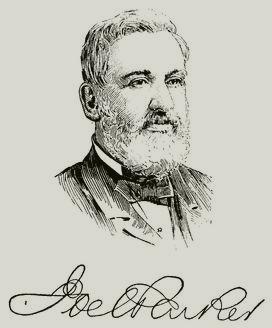Post by Freehold Resident on Aug 30, 2006 12:17:08 GMT -5
Joel Parker (November 24, 1816 – January 2, 1888) was an American politician, best known as the Governor of New Jersey from 1863-1866 and from 1871-1874.
Early life, family
Born in Freehold, New Jersey to Charles and Sarah (Coward) Parker, he attended the College of New Jersey (later known as Princeton University), graduating in the class of 1839. He worked in the law office of Henry W. Green and was admitted to the bar in 1842.
He married Maria Gummere in 1843 and the couple had two sons and a daughter.
Political career
A Democrat, he was elected to the New Jersey General Assembly in 1847, where he served until 1851 when he was appointed the "prosecutor of pleas" of Monmouth County. He continued to be active in politics and served as a New Jersey elector in the U.S. presidential election, 1860, casting his vote for Stephen A. Douglas.
In 1860, New Jersey Governor Charles Smith Olden appointed Parker Major General of the New Jersey militia.
Governor, first term
He was nominated for Governor by the Democratic Party in 1862, and ran as a "War Democrat" who supported a military solution to the American Civil War rather than accommodation of the Confederacy. He defeated Marcus L. Ward by the largest margin in State history.
Although staunchly in favor of the war, Parker was also highly critical of the Lincoln Administration's actions with respect to curtailing civil liberties in the name of the war effort, castigating Lincoln for suspending habeas corpus and for what Parker considered the unconstitutional nature of the Emancipation Proclamation.
In 1863, Parker attended the ceremonies dedicating the Soldiers' National Monument at which Lincoln delivered the Gettysburg Address.
He was the "favorite son" candidate supported by New Jersey electors at the Democratic National Conventions in 1868, 1876, and 1884.
Parker was re-elected Governor in 1871 and served until 1874. He was then Attorney General of New Jersey and later served as a justice on the New Jersey Supreme Court from 1880-1888.
After serving as Governor, Parker returned to the practice of law. He is buried in Maplewood Cemetery, Freehold, New Jersey.
Early life, family
Born in Freehold, New Jersey to Charles and Sarah (Coward) Parker, he attended the College of New Jersey (later known as Princeton University), graduating in the class of 1839. He worked in the law office of Henry W. Green and was admitted to the bar in 1842.
He married Maria Gummere in 1843 and the couple had two sons and a daughter.
Political career
A Democrat, he was elected to the New Jersey General Assembly in 1847, where he served until 1851 when he was appointed the "prosecutor of pleas" of Monmouth County. He continued to be active in politics and served as a New Jersey elector in the U.S. presidential election, 1860, casting his vote for Stephen A. Douglas.
In 1860, New Jersey Governor Charles Smith Olden appointed Parker Major General of the New Jersey militia.
Governor, first term
He was nominated for Governor by the Democratic Party in 1862, and ran as a "War Democrat" who supported a military solution to the American Civil War rather than accommodation of the Confederacy. He defeated Marcus L. Ward by the largest margin in State history.
Although staunchly in favor of the war, Parker was also highly critical of the Lincoln Administration's actions with respect to curtailing civil liberties in the name of the war effort, castigating Lincoln for suspending habeas corpus and for what Parker considered the unconstitutional nature of the Emancipation Proclamation.
In 1863, Parker attended the ceremonies dedicating the Soldiers' National Monument at which Lincoln delivered the Gettysburg Address.
He was the "favorite son" candidate supported by New Jersey electors at the Democratic National Conventions in 1868, 1876, and 1884.
Parker was re-elected Governor in 1871 and served until 1874. He was then Attorney General of New Jersey and later served as a justice on the New Jersey Supreme Court from 1880-1888.
After serving as Governor, Parker returned to the practice of law. He is buried in Maplewood Cemetery, Freehold, New Jersey.
